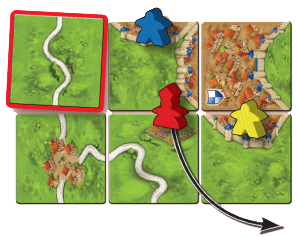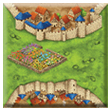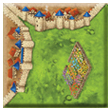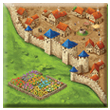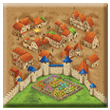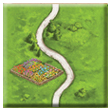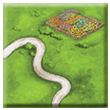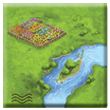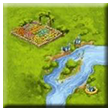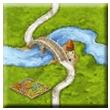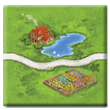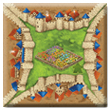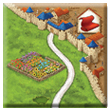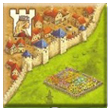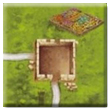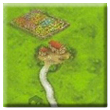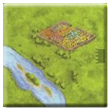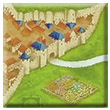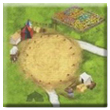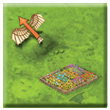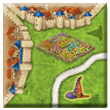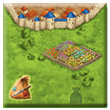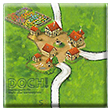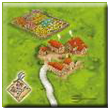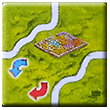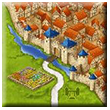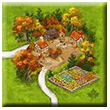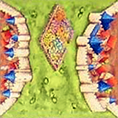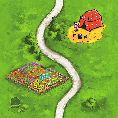Opat
 |
You are reading the rules for this tile design. |
| If your tiles have a different design, then choose a game from Spin-offs. |  |
General info and comments

Opat was originally released by Hans im Glück in 2014.
It introduces the abbot meeple and garden features. [1]
Along with ![]() Rzeka,
Rzeka, ![]() Opat is considered part of the basic game that can be used as desired. [2] It implements a mechanic that is unique to the new edition of Carcassonne, diverging in this aspect from the 1st edition.
Opat is considered part of the basic game that can be used as desired. [2] It implements a mechanic that is unique to the new edition of Carcassonne, diverging in this aspect from the 1st edition.
With its introduction in 2014, tiles featuring gardens became available in the new design ![]() Gra podstawowa which included
Gra podstawowa which included ![]() Rzeka. Later, they appeared on tiles in the major expansions as they were re-released in the new artwork, and in
Rzeka. Later, they appeared on tiles in the major expansions as they were re-released in the new artwork, and in ![]() Big Box 6 when it was released in 2017. [3] Bear in mind that
Big Box 6 when it was released in 2017. [3] Bear in mind that ![]() Opat provides a new mechanic involving the abbot meeple, but the tiles it affects are not part of the expansion itself. Garden tiles that have been included in the base game and in expansions are listed for information in the tile distribution below.
Opat provides a new mechanic involving the abbot meeple, but the tiles it affects are not part of the expansion itself. Garden tiles that have been included in the base game and in expansions are listed for information in the tile distribution below.
Finally, it must be noted that the (new) abbot in this expansion is not the same as the (old) abbot used on ![]() German, Dutch and Belgian Monasteries, and
German, Dutch and Belgian Monasteries, and ![]() Japońskie Budowle. The new abbot is a specialized meeple for monasteries and gardens whereas the old abbots were normal meeples placed on specialized monasteries. Just in case things weren’t confusing enough already.
Japońskie Budowle. The new abbot is a specialized meeple for monasteries and gardens whereas the old abbots were normal meeples placed on specialized monasteries. Just in case things weren’t confusing enough already.
| Changes to the 20th Anniversary Edition and Carcassonne C3
The rules for the 20th Anniversary Edition stay the same but the roles of some meeples have been updated:
Publishers have followed the new roles provided in the rules by HiG, although some of these changes are not noticeable in other languages. Note: We stick to the classic role convention for the sake of consistency with all the exisiting rules for the time being. HiG may decide to update the rules in the future to follow this new naming convention for new releases and reprints. |
Contents
- 5 abbots, one in each player color. [4]
Rules
Preparation
Each player adds the abbot of their color to their supply. With the exception of the new rules used with this mini-expansion, all basic Carcassonne rules remain unchanged.
Gameplay
1. Ułożenie płytki
When placing a tile with a garden, you must place it so that its edges match the edges of tiles already in play.
2. Wystawienie podwładnych
3. Scoring with the abbot
When the monastery or garden occupied by your abbot is surrounded by eight tiles, you score 9 points (just like a regular monastery scoring).
On your turn, if you do not place a meeple during the 2. Wystawienie podwładnych phase, [10] [11] [12] you may instead return your already-placed abbot to your supply. If you do so, you score immediately as many points as the garden or monastery your abbot occupied is worth at that time, [13] [14] [15] exactly like how monasteries are scored during the final scoring. [16]
Punktacja końcowa
During final scoring, the abbot is scored as a normal monk.
Tile distribution
The following tile distribution includes all the tiles featuring a garden that can be found in the ![]() Gra podstawowa and the expansions released until now (12/2022) for C2 and C3.
Gra podstawowa and the expansions released until now (12/2022) for C2 and C3.
![]() Rozszerzenie 1. - Karczmy i katedry
Rozszerzenie 1. - Karczmy i katedry
![]() Rozszerzenie 2. - Kupcy i Budowniczowie
Rozszerzenie 2. - Kupcy i Budowniczowie
![]() Rozszerzenie 3. - Księżniczka i Smok
Rozszerzenie 3. - Księżniczka i Smok
![]() Rozszerzenie 5. - Opactwo i burmistrz
Rozszerzenie 5. - Opactwo i burmistrz
![]() Rozszerzenie 6. - Hrabia, Król i Rzeka
Rozszerzenie 6. - Hrabia, Król i Rzeka
![]() Rozszerzenie 8. - Mosty, zamki i bazary
Rozszerzenie 8. - Mosty, zamki i bazary
![]() Rozszerzenie 9. - Owce i wzgórza
Rozszerzenie 9. - Owce i wzgórza
![]() Rozszerzenie 10. - Cyrk objazdowy
Rozszerzenie 10. - Cyrk objazdowy
![]() Płytki promocyjne Spiel Doch! 2/2018
Płytki promocyjne Spiel Doch! 2/2018
![]() CutCassonne (Cut & Play)
CutCassonne (Cut & Play)
![]() Wróżbita (Print & Play)
Wróżbita (Print & Play)
Przypisy
W celu zapoznania się z objeśnieniami ikon oraz licencjami odwiedź: Ikony.
- ↑
 Gardens do not count as monasteries in relation to their interaction with other expansions, such as Message 3 (Smallest monastery) from
Gardens do not count as monasteries in relation to their interaction with other expansions, such as Message 3 (Smallest monastery) from  Kurierzy. (10/2018)
Kurierzy. (10/2018)
Clarification by Christof Tisch (HiG) on BGG:
https://boardgamegeek.com/thread/2060792/article/30130380#30130380
 This clarification can be generalized to other expansions providing bonus affecting monasteries (monastic buildings) but not gardens:
This clarification can be generalized to other expansions providing bonus affecting monasteries (monastic buildings) but not gardens:
 Rozszerzenie 9. - Owce i wzgórza: Vineyards
Rozszerzenie 9. - Owce i wzgórza: Vineyards Koło Fortuny: The Inquisition sector
Koło Fortuny: The Inquisition sector Mini #2 - Kurierzy: Message 3 (Smallest Monastery)
Mini #2 - Kurierzy: Message 3 (Smallest Monastery) Targi w Lipsku: Bookbinders quarter bonus
Targi w Lipsku: Bookbinders quarter bonus Strażnice: Bonus for monasteries (monastic buildings)
Strażnice: Bonus for monasteries (monastic buildings)
- ↑
 As stated in the rules of
As stated in the rules of  Big Box 6.
Big Box 6.
- ↑
 The expansions included in
The expansions included in  Big Box 6 that contained garden tiles are
Big Box 6 that contained garden tiles are  Karczmy i katedry,
Karczmy i katedry,  Kupcy i budowniczowie,
Kupcy i budowniczowie,  Maszyny latające,
Maszyny latające,  Mag i Wiedźma and
Mag i Wiedźma and  Bandyci.
Bandyci.
- ↑
 As far as the
As far as the  Big Box 6 is concerned, the sixth set of (pink) meeples is a part of the basic game, not
Big Box 6 is concerned, the sixth set of (pink) meeples is a part of the basic game, not  Karczmy i katedry. The same happens in
Karczmy i katedry. The same happens in  Big Box 6 with the sixth abbot meeple. Prior to
Big Box 6 with the sixth abbot meeple. Prior to  Big Box 6, the Base Game included five abbots, with the sixth included with the sixth set of meeples in
Big Box 6, the Base Game included five abbots, with the sixth included with the sixth set of meeples in  Karczmy i katedry.
Karczmy i katedry.
- ↑
 An abbot could be placed onto an abbey or a shrine/cult place, as they are considered monasteries (albeit the latter heretic). The abbot can be involved in a challenge between a monastery/abbey and a shrine/cult place. The abbot's special ability would allow him to quit the challenge, even if his monastery/abbey or shrine/cult place was not complete, and would score the incomplete feature (monastery, abbey or shrine/cult place). See
An abbot could be placed onto an abbey or a shrine/cult place, as they are considered monasteries (albeit the latter heretic). The abbot can be involved in a challenge between a monastery/abbey and a shrine/cult place. The abbot's special ability would allow him to quit the challenge, even if his monastery/abbey or shrine/cult place was not complete, and would score the incomplete feature (monastery, abbey or shrine/cult place). See  Opactwo i burmistrz and
Opactwo i burmistrz and  Hrabia, Król i Rzeka for more details.
Hrabia, Król i Rzeka for more details.
- ↑
 An abbot could be placed onto other features considered monasteries: German monasteries, Dutch & Belgian monasteries, Japanese buildings and Darmstadt churches. The same rules mentioned in the previous note would apply. See
An abbot could be placed onto other features considered monasteries: German monasteries, Dutch & Belgian monasteries, Japanese buildings and Darmstadt churches. The same rules mentioned in the previous note would apply. See  Klasztory w Niemczech /
Klasztory w Niemczech /  Japońskie Budowle,
Japońskie Budowle,  Klasztory w Holandii i Belgii, and
Klasztory w Holandii i Belgii, and  Płytki promocyjne - Darmstadt for more details.
Płytki promocyjne - Darmstadt for more details.
- ↑
 The abbot is considered a meeple, but he has limitations as described in this sentence. Therefore the abbot can use a magic portal and can be used as a flier. However, the abbot can only end up on an unfinished monastery or garden, and the monastery or garden must be unclaimed if using the magic portal. (3/2015)
The abbot is considered a meeple, but he has limitations as described in this sentence. Therefore the abbot can use a magic portal and can be used as a flier. However, the abbot can only end up on an unfinished monastery or garden, and the monastery or garden must be unclaimed if using the magic portal. (3/2015)
- ↑
 In contrast with the previous clarification from 3/2015, the Order of Play included in
In contrast with the previous clarification from 3/2015, the Order of Play included in  Big Box 6 omits the abbot from the list of figures that can be a flier. This omission is due to a mistake by HiG, as confirmed by one of the German proofreaders (Kettlefish) in this post from 5/2018 on Carcassonne Central:
Big Box 6 omits the abbot from the list of figures that can be a flier. This omission is due to a mistake by HiG, as confirmed by one of the German proofreaders (Kettlefish) in this post from 5/2018 on Carcassonne Central:
http://www.carcassonnecentral.com/community/index.php?topic=3384.msg58360#msg58360
The same omission is still present in rules translated into other languages. (01/2019) - ↑
 The abbot cannot be placed on a tower. See
The abbot cannot be placed on a tower. See  Wieża for more information.
Wieża for more information.
- ↑
 You do not place a meeple because you have decided not to, or you don't have any left in your supply.
You do not place a meeple because you have decided not to, or you don't have any left in your supply.
- ↑
 The wording of the ZMG rules speak about "the player deciding to not place a meeple." This can be misleading. It may be interpreted as if the player needs at least one meeple in their supply in order to decide not to place it. This is not the intent in the original rules by HiG.
The wording of the ZMG rules speak about "the player deciding to not place a meeple." This can be misleading. It may be interpreted as if the player needs at least one meeple in their supply in order to decide not to place it. This is not the intent in the original rules by HiG.
- ↑
 The actual C II rules refer to not placing a "meeple," but they are also referring to special figures not considered as meeples such as the builder, the pig or the barn, as can be implied according to the figure classification provided in
The actual C II rules refer to not placing a "meeple," but they are also referring to special figures not considered as meeples such as the builder, the pig or the barn, as can be implied according to the figure classification provided in  Big Box 6 and making it extensive to all the expansions. Therefore this stipulation actually refers to not performing any other 2. Wystawienie podwładnych action at all but this is not explicitly stated. In other words, the publisher was keeping the rules as simple as possible at the moment when not all the new edition expansions had been released. (12/2014, updated 3/2015, updated 9/2018)
Big Box 6 and making it extensive to all the expansions. Therefore this stipulation actually refers to not performing any other 2. Wystawienie podwładnych action at all but this is not explicitly stated. In other words, the publisher was keeping the rules as simple as possible at the moment when not all the new edition expansions had been released. (12/2014, updated 3/2015, updated 9/2018)
- ↑
 This scoring occurs immediately during the 2. Wystawienie podwładnych phase when the abbot is removed. This effectively protects the abbot from the dragon and, if playing with Carcassonne I rules, produces a scoring round for Messages. Afterwards, the normal scoring phase occurs. (3/2015, updated 10/2024)
This scoring occurs immediately during the 2. Wystawienie podwładnych phase when the abbot is removed. This effectively protects the abbot from the dragon and, if playing with Carcassonne I rules, produces a scoring round for Messages. Afterwards, the normal scoring phase occurs. (3/2015, updated 10/2024)
- ↑
 You can only score the abbot placed on a monastery or a garden before the feature is completely surrounded by tiles. In this case, you always score the abbot (on the feature), never the feature itself. (11/2020)
You can only score the abbot placed on a monastery or a garden before the feature is completely surrounded by tiles. In this case, you always score the abbot (on the feature), never the feature itself. (11/2020)
- ↑
 Abbots placed as abbots on special monasteries (German monasteries, Dutch & Belgian monasteries or Japanese buildings) could be also removed as per the interpretation of the rules. The Abbot rules don't contain any limitation to prevent players from doing so.
Abbots placed as abbots on special monasteries (German monasteries, Dutch & Belgian monasteries or Japanese buildings) could be also removed as per the interpretation of the rules. The Abbot rules don't contain any limitation to prevent players from doing so.
In this case, a player removing the abbot from a special monastery will score it as if placed on a normal monastery at the end of the game, as indicated in the rules (the position of the abbot meeple is irrelevant). Note that you are scoring the meeple, not the feature it is placed on.
An official clarification would be necessary. - ↑
 If playing with
If playing with  Maszyny latające, the
Maszyny latające, the  Rozszerzenie Jubileuszowe or
Rozszerzenie Jubileuszowe or  Prezenty, several meeples may occupy the same feature. As a consequence, multiple abbots may occupy a monastery or a garden. If so, each abbot could be removed and scored separately (no majority applied) before the feature is completed. This means, the monastery or garden could be partially scored several times before it is completed. When scored during or after the game, a monastery or garden with several meeples will take into account the majority on the feature.
Prezenty, several meeples may occupy the same feature. As a consequence, multiple abbots may occupy a monastery or a garden. If so, each abbot could be removed and scored separately (no majority applied) before the feature is completed. This means, the monastery or garden could be partially scored several times before it is completed. When scored during or after the game, a monastery or garden with several meeples will take into account the majority on the feature.





